Are FREE VPNs Safe or Actually Dangerous?
Free VPNs are making you less safe, and this article will show you why. There are many areas in life where cutting costs is prudent, but your privacy online is not one of them. We’ll walk you through the dangers of free VPNs, then recommend some outstanding providers guaranteed to enhance your security without breaking the bank.
You’ve heard by now that you should be using a VPN when you browse the internet in order to protect your privacy and stay safe. But like many people, maybe you feel tempted to try out a free VPN rather than shelling out for a paid VPN. It’s tempting to try to save some money by using a free service instead of a paid one.
But you should reconsider if you were thinking that a free VPN will solve your security problems. In fact, free VPNs can actually cause more problems and greater security risks than not using a VPN at all!
A well publicised study came out last year which had all sorts of worrying findings: from 84% of VPN apps surveyed from the Google Play store that didn’t encrypt properly using the latest encryption methods, to 75% of the apps tracking their users data. This story was covered all over the technology industry press in Wired, on The Verge, and in the International Business Times among others, so you know that this is a serious issue.
Don’t cheap out on your Internet security with unsafe free VPNs, use these affordable providers instead:
- NordVPN – Best Overall VPN – NordVPN isn’t free, but it’s myriad security provisions might just be priceless. For a low price, you get the best encryption, the best network, and outstanding speeds.
- Surfshark – Unlimited connections let you split your subscription with a friend, making top-shelf privacy features available dirt-cheap.
- ExpressVPN – Costs a little more, but you’ll notice the difference in performance and usability.
- PureVPN – Modestly-priced VPN with spoofable access to the greatest number of countries’ virtual IP addresses.
- IPVanish – Like free stuff? Pay for a modest sum for a truly secure VPN to torrent legal content to your heart’s content.
- VyprVPN – An invaluable resource for those living with under the harshest censorship in the world.
Today we’re going to go through the details of how a VPN should work and why you would use one, then talk about the security problems with free VPNs, then recommend some reputable paid VPNs that will be effective at keeping you safe online. We want you to know about the issues with some VPN services so that you can learn why free VPNs are actually making you less safe.
What’s The Problem With Free VPNs?
So you can see why people would want to use a VPN for both security and convenience reasons. But what’s the problem with free VPNs? Why not just use a free VPN service instead of a paid one?
The biggest issue with free VPNs is that if the companies are not making money from user subscriptions, they must be making money elsewhere in order to pay for their server and administration costs. Some of the ways which free VPNs make their money include by injecting extra adverts into web pages that its users browse, which is obviously annoying, and selling off the data about their users’ internet history to third parties, which is exactly the kind of privacy breach that VPNs should be preventing.
One prominent example of this kind of problem with free VPNs was Hola. This was a popular free VPN service until it came to light that they were selling off their user data. And even worse, the way the user network was set up meant that unwitting users’ devices were used for malicious purposes like performing DDoS attacks.
RELATED READING: How Hola made its users part of a botnet
Hola isn’t the only free VPN with problems. In the study that we mentioned by Australia’s Commonwealth Scientific and Industrial Research Organization, findings included that 18% of the mobile VPN apps tested from the Google Play store didn’t actually encrypt traffic at all, and were therefore utterly useless – but were giving users the illusion of security. A further 38% of the apps tested injected malware or malicious advertising software which is designed to gain access to users’ private information. A massive 84% of the apps leaked some amount of data about users’ internet traffic, undermining their claim to security. And finally, over 80% of these apps required access to sensitive data from users’ phones such as text messages, which there is no reason for a VPN to be accessing.
Somehow most worryingly of all, only 1% of users reported any privacy concerns about these apps, suggesting that users believed that their privacy was being protected even while it was in fact being compromised.
Since this report came out, some of the offending apps have been removed from the Google Play store. However, the dangers shown by these free VPNs are true for other platforms and other apps too – this is not just an Android problem.
You can see that there are big risks posed by free VPNs. In fact, using a free VPN may be even worse for your security than not using a VPN at all. So how do you know which VPNs are trustworthy?
How To Select A Reputable VPN
When it comes to assessing VPNs, there are a few key factors which you should consider. It’s a good idea to do research into any VPN provider that you are planning to try out to learn more about their service and what kind of security and privacy features that they offer. Here are the most important issues to look into when selecting a VPN:
- Excellent security. The most important feature of a VPN is its security. You should look for a VPN that uses strong 256-bit encryption and has features like DNS leak protection for the best possible security.
- Excellent privacy guarantees. The problem of VPNs is that you must trust your VPN provider to protect your personal information like your browsing history and no to sell that information off or hand it over to the government for surveillance purposes. The best way to ensure that your data is not compromised is for it to not be collected in the first place. Look for VPN providers with what is called a no logging policy, meaning that the provider will not keep any records of your internet use. This way, with a no logging policy, you can be sure your data will not be sold off or handed over because there is no permanent data that your provider records.
- Fast connections. For convenience’s sake, you don’t want to deal with slow connections that make web pages take forever to load and lead to endless buffering when you try to watch videos. A good VPN should have connections which are so fast that you barely even notice that you’re using a VPN rather than just browsing normally over your unsecured connection.
- A large server network with servers in many different countries. A good VPN will have a large number of servers available for your use, so that you can easily find one which works quickly and reliably and which meets your needs. The more servers that are available, the more flexible your VPN can be. Also look for servers in many different countries, so that you can easily get around regional restrictions to access content from all over the world.
Best Paid VPNs You Can Trust To Protect Your Privacy
If you’re interested in getting a VPN but you aren’t sure which providers are the most reliable, then we have recommendations for reputable paid VPNs that meet all of these requirements and which are sure to keep your internet traffic safe. Here are the top paid VPNs:
1. NordVPN

If your primary concern is security, then we recommend NordVPN. This provider is known for their exceptional security, with the essential strong 256-bit encryption and a no logging policy. They also have a special double encryption feature, in which your data is encrypted and sent to a server, where it is then encrypted again and sent to another server before being decrypted and sent on its way. This double encryption is essentially impossible for even the most sophisticated technology to crack, giving you the best protection possible.
The connection speeds are solid and the server network offers more than 5,500 servers in over 60 different countries for you to choose from. You can get the software for Windows, Mac OS, Linux, iOS, Chrome OS, Android, and Windows Phone, and there is also a Chrome browser extension which you can use to easily monitor your VPN connection and to connect to a new server of your choosing.
Read our full NordVPN review.
- SPECIAL OFFER: 2-yr plan (70% off - link below)
- No bandwidth caps
- Up to 6 simultaneous connections
- Based in Panama
- Money back guarantee policy (30-days).
- Some servers can be slow and unreliable
- They can take 30 days to process refunds.
2. Surfshark
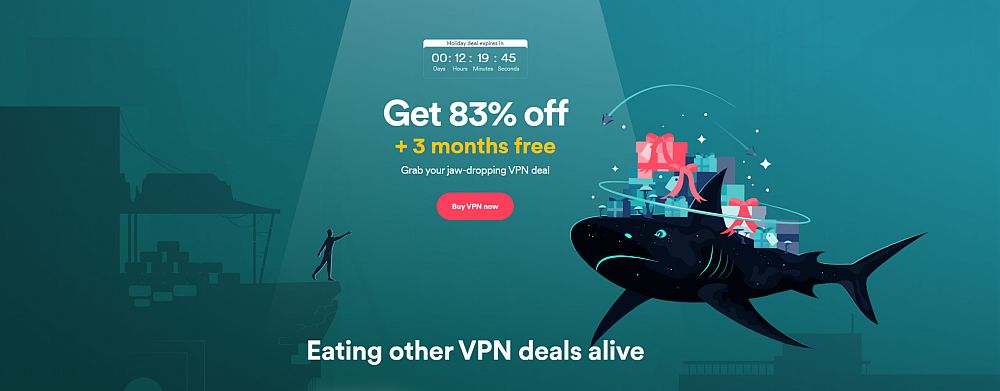
Look, we understand the appeal of saving a buck. But with dirt-cheap VPN providers like Surfshark, there’s literally no excuse to go with some random “free” service which will just harvest your data and leave you vulnerable. Let’s break it down…
Surfshark is already inexpensive to begin with, but they rather uniquely offer unlimited simultaneous connections. Yes, this means you can protect all your devices, but think big: you can split the cost of a single subscription among friends and get the price down to basically nothing.
What you get in return is the most modern encryption (256-AES-GCM) and tunneling (OpenVPN, IKEv2/IPSec, WireGuard) commercially available. Zero logging, kill switch, anti-malware and adblocking, blanket obfuscation to beat censorship–you name it. Every one of their 800+ servers unblocks Netflix with no hassle.
Seriously, what are you waiting for?
- Reliably unblocks Netflix US, UK, Japan, and more
- Multi-hop connections readily available
- Unbreakable AES-256-GCM encryption on every connection
- Zero logging policy ensures your activity can't be used against you
- Responsive customer support available 24/7.
- Server network is not nearly as expansive as major competitors
- Young VPN still has plenty of room to grow in terms of advanced functionality.
Read our full Surfshark review.
3. ExpressVPN
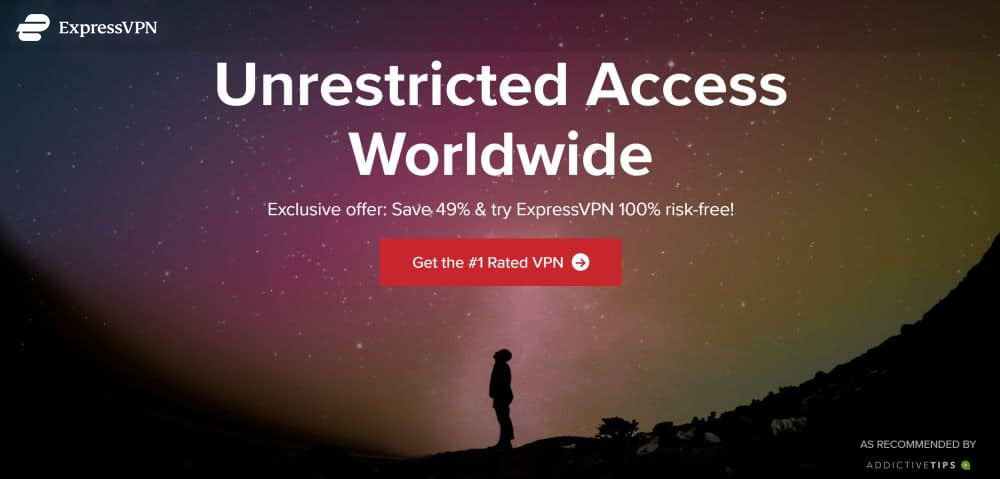
ExpressVPN is one of the most popular VPNs among power users, thanks to its super fast connections and excellent security. It uses strong 256-bit encryption to keep your data safe and has a no logging policy to protect your privacy, and has a huge network of over 3,000 servers in 94 countries around the world.
The ExpressVPN software is particularly easy to use, with simple graphical representations that let you see at a glance if you are connected or not. You can install the ExpressVPN software onto a variety of platforms, including Windows, Mac OS, Linux, iOS, and Android. Using this software will encrypt not only the traffic passing through your web browser, but also other types of traffic like P2P downloads or chat communications.
If you’re looking for an even easier way to use a VPN, you can install ExpressVPN’s browser extension for Google Chrome or Mozilla Firefox. You just need to connect using the icon in the address bar of your browser and all of your browsing will be private. This is the ideal solution for someone who wants a quick and easy way to protect themselves without a lot of technical knowledge required.
Read our full ExpressVPN review.
- SPECIAL OFFER: 3 months free (49% off - link below)
- Super fast, reliable connection
- Secure encryption & VPN protocols
- No logging policy well enforced
- Live Chat Support.
- Power-users configuration options.
4. PureVPN
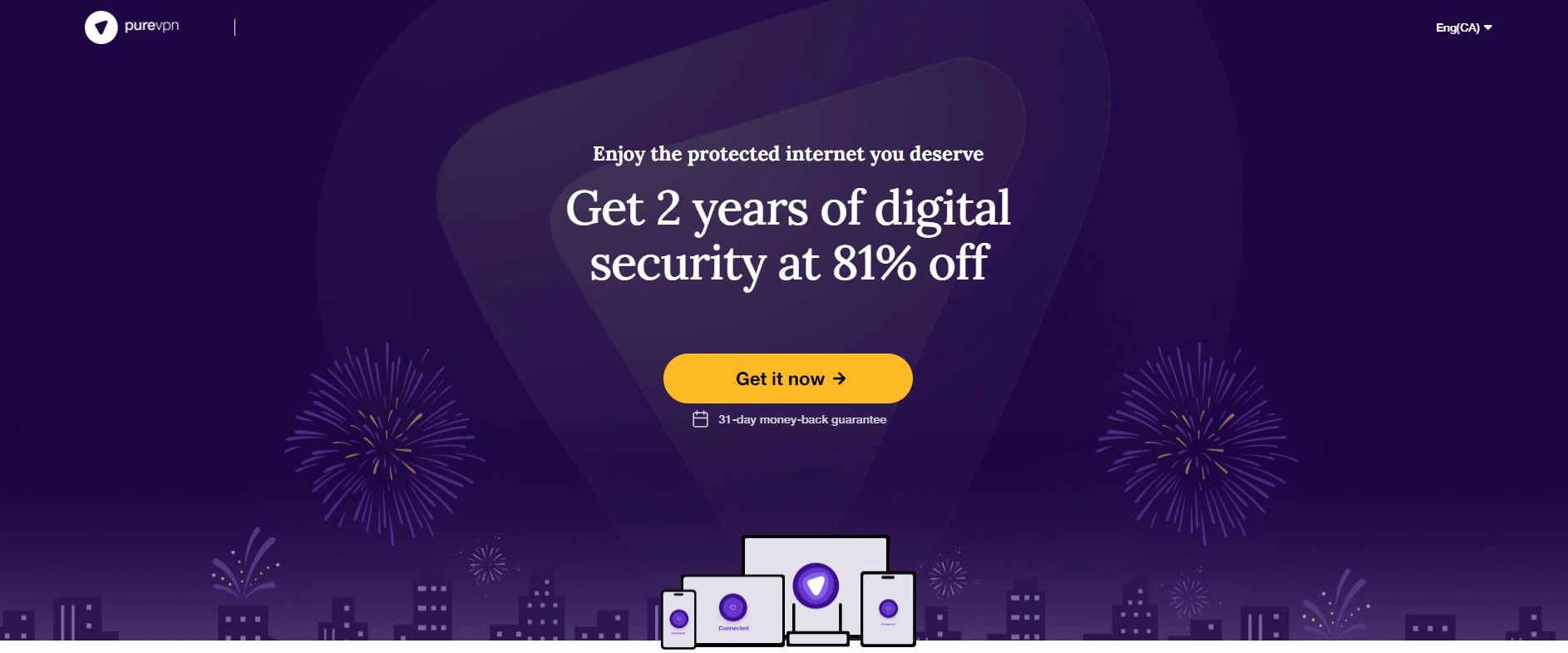
If you’re finding all of this information a bit too technical and you want one of the simplest and easiest to use security packages, then we recommend PureVPN. This VPN uses strong 256-bit encryption and has a no logging policy, and comes with access to a network of 2,000+ servers in 140+ different countries. The software is very easy to use and is available for Windows, Mac OS, Android, iOS, and Android TV, plus browser extensions for Chrome and Firefox.
In addition to the VPN, with PureVPN you also get a package of other security features. There are anti spam measures to prevent your inbox from being clogged up with spam messages, and there is app filtering so you can restrict the use of certain apps over your network. Finally, there is also anti virus and anti malware protection to prevent your device from bein infected with unwanted or potentially dangerous software. This all in one package makes PureVPN a great choice for newer users.
Read our full PureVPN review.
5. IPVanish
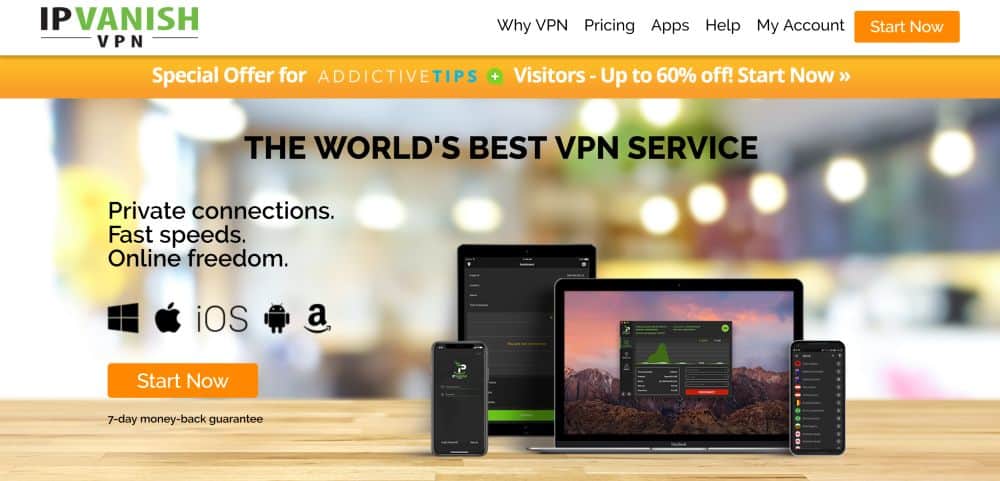
IPVanish is a top choice for users who want maximum flexibility and many extra features for added security. As well as lightning fast connections and strong 256-bit encryption, the service includes DNS leak protection and has a extra feature kill switch which you can set to cut of your internet connection if you are disconnected from the server for any reason. This ensures that you won’t accidentally send sensitive information over an unsecured network.
The server network covers 1,300+ servers in 75+ locations worldwide, so you’ll be able to find a server in the country of your choice for getting around regional restrictions. You’ll also find software supports for plenty of platforms, including Windows 7, 8, and 10, plus Mac OS, Linux, and Android. Of course, there is also a no logging policy to ensure that your data never gets into the wrong hands.
Read our full IPVanish review.
6. VyprVPN
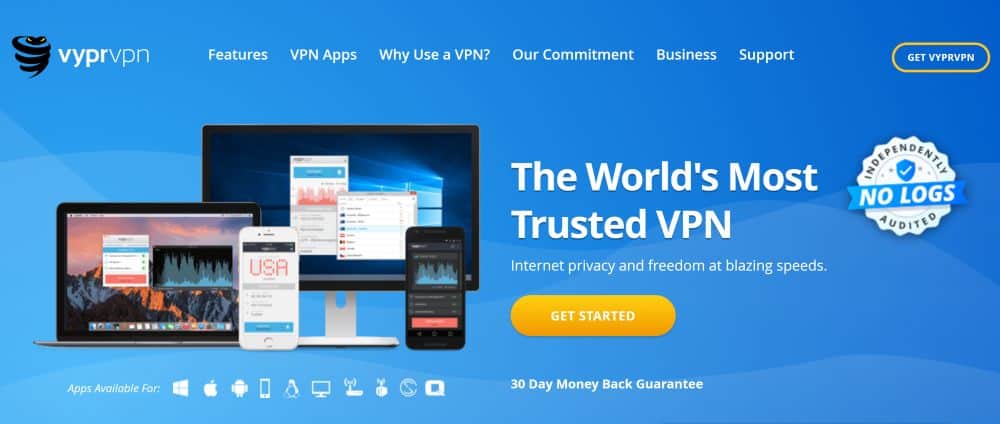
When you want to be absolutely sure that your internet traffic isn’t being snooped on by government or law enforcement agencies, then VyprVPN is the VPN for you. You’ll get the essential 256-bit encryption and no logging policy, but there is also a special double encryption protocol called Chameleon which protects your metadata such as the origin and destination of your encrypted data packets through an extra layer of encryption.
This double encryption is especially useful if you need to get around VPN blocking software such as that found in China, as VPN blocks look for discrepancies between the metadata to indicate use of a VPN and to block it from the network. With Chameleon, VPN blocking software cannot see the metadata and therefore cannot block the traffic. If you need to use a VPN in a restricted region like China then VyprVPN will keep you safe even on VPN blocked networks.
The software is available for Windows, Mac, Android, and iOS, and the network has more than 700 servers in 70 different countries.
Read our full VyprVPN review.
What Benefits Does A Good VPN Offer To Users?
A VPN is an important piece of your security when going online. There are a few different advantages of using a VPN which users should be aware of:
Prevent anyone from tracking your internet activity
When you use an unsecured internet connection, such as your home network, then all of the activity on this connection is viewable to your ISP. If they decide to look into your activity, your ISP can see exactly which web sites you have visited and when, what files you have downloaded, and what other kinds of traffic (such as P2P downloads) you have used. All of this means that it is incredibly easy for your ISP to see your full internet history. If your government or another agency wants to investigate you, they can force your ISP to hand over all of this data too – so your full internet history could be visible to government surveillance or police investigators.
- How a VPN helps: When you install a VPN onto your device, all of that data that you send over the internet is first encrypted. The encrypted data is sent on to a server located somewhere else in the world, where it is then decrypted and sent on its way. This encryption means that it is effectively impossible for any outside observers to see or track your internet use. Even your ISP can only see how much data you have transferred, not what the contents of that data is. Even if a government agency requests tracking information from your ISP, your ISP has no meaningful data about your internet use to hand over.
Get around region locks
One common reason for users to try out a free VPN is that they want to access content from different geographical regions. For some websites, such as Netflix, the content of the site that is available to visitors depends upon where theses visitors are physically located. Or other sites, such as the Comedy Central website, have content which is only available if you are located in a particular country – in this case, in the US. When you try to access this content from a different location, you’ll get an error message.
- How a VPN helps: You can use a VPN to get around these regional locks. When you connect to a server in another location, your encrypted data is sent there to be decrypted and to be sent on to its original destination. This makes it appear as if your traffic is originating from the location of the server rather than your actual location. So if you live in, say, India, and you connect to a VPN server in the US, you’ll then be able to access region-locked content to watch videos on the Comedy Central website, or to see the US version of the Netflix catalogue.
Conclusion
Getting a VPN is an important step in keeping yourself safe and protected online. However, many of the free VPN services out there are untrustworthy and potentially even dangerous. From selling off your user data to unwittingly co-opting your device for use in DDoS attacks, there are many problems with the free VPNs you’ll find available.
Instead, we strongly urge you use a reputable paid VPN service such as one of the ones that we have recommended. These will keep you safe and protect your data, and will be much more effective and trustworthy than free VPNs.
Have you had a bad experience with free VPNs? Which VPN services have you found to be trustworthy? Let us know your opinion in the comments below.
If you need a VPN for a short while when traveling for example, you can get our top ranked VPN free of charge. NordVPN includes a 30-day money-back guarantee. You will need to pay for the subscription, that’s a fact, but it allows full access for 30 days and then you cancel for a full refund. Their no-questions-asked cancellation policy lives up to its name.

I always use ivacy vpn to stay secure.